GĐXH - This man has had difficulty urinating for about a month now. When he went to the hospital, he was unexpectedly diagnosed with prostate cancer.
Recently, doctors at Quang Ninh Provincial General Hospital announced the first-ever laparoscopic total prostatectomy performed on a male patient with prostate cancer. This is a new, minimally invasive technique aimed at improving the quality of treatment.
The patient, Mr. Vu Van H. (69 years old) from Yet Kieu ward, Ha Long city, has been experiencing urinary retention and difficulty urinating for about a month, affecting his daily life.
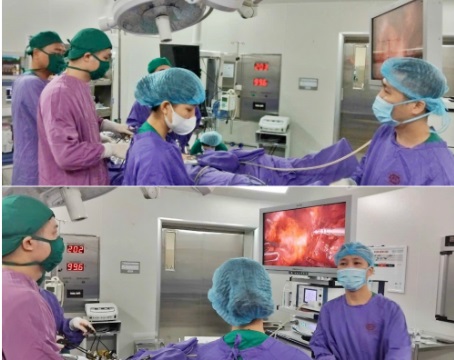
The patient went to Quang Ninh General Hospital for examination and was tested and found that the PSA index (prostate cancer marker) in the blood increased. MRI scan of the pelvis revealed a nodule in the prostate gland, and a prostate biopsy showed that it was prostate carcinoma. After consulting with specialists, the doctors decided to perform endoscopic surgery to remove the entire prostate gland.
Following the surgery, the patient's condition improved, with no pain, and they were able to walk and eat normally from the second day. The urinary catheter was removed after 9 days. To date, the patient is urinating independently and is preparing for discharge.
Patient H. shared: "When I heard about cancer, everyone in my family was confused and worried. I also hesitated when I had cancer treatment at the Provincial General Hospital, but after the doctor's enthusiastic advice and gentle endoscopic surgery, I decided to get treatment here. After the surgery, I saw that I had recovered well, and my family and I were very happy. Thank you to the doctors for your enthusiasm and dedication to patients."
Dr. CKII Pham Viet Hung, Head of the Department of Surgery, Provincial General Hospital said: "Endoscopic surgery to remove the entire prostate is one of the most difficult and complicated surgeries in the treatment of urinary tract cancer, causing many challenges for surgeons. Because the prostate is located deep in the abdomen, below the pubic bone, with many blood vessels and large venous sinuses, it requires the doctor to have a solid understanding of anatomy, skillful techniques and experience in handling surgical situations to be able to operate in a very small space, control bleeding well, and preserve urinary and physiological functions. In developed countries, this surgery is performed by robots, which is very expensive.
Although it is complicated and risky, we are still determined to carry it out because this method brings many benefits to patients, reducing trauma due to no open surgery, limiting the risk of infection, blood loss, short hospital stay, quick recovery, especially in elderly and frail patients like patient H. With the effort to constantly learn, we are determined to implement this technique with this first case with positive results, helping cancer patients to be treated gently, thoroughly and long-term."
Doctors recommend: Men over 50 years old should be screened for prostate cancer regularly, especially those with high risk factors such as family history of the disease. It is necessary to pay attention to unusual signs such as difficulty urinating, painful urination, blood in urine, or pain in the lower back and pelvis for early examination and timely detection, thereby helping to increase the chance of survival and reduce dangerous complications.
 Is prostate cancer preventable?
Is prostate cancer preventable?Source: https://giadinh.suckhoedoisong.vn/nguoi-dan-ong-o-quang-ninh-phat-hien-ung-thu-tuyen-tien-liet-tu-dau-hieu-nhieu-nam-gioi-viet-bo-qua-172241105110647288.htm





![[Photo] Prime Minister Pham Minh Chinh holds a phone call with the CEO of Russia's Rosatom Corporation.](/_next/image?url=https%3A%2F%2Fvphoto.vietnam.vn%2Fthumb%2F1200x675%2Fvietnam%2Fresource%2FIMAGE%2F2025%2F12%2F11%2F1765464552365_dsc-5295-jpg.webp&w=3840&q=75)
![[Photo] Closing Ceremony of the 10th Session of the 15th National Assembly](/_next/image?url=https%3A%2F%2Fvphoto.vietnam.vn%2Fthumb%2F1200x675%2Fvietnam%2Fresource%2FIMAGE%2F2025%2F12%2F11%2F1765448959967_image-1437-jpg.webp&w=3840&q=75)

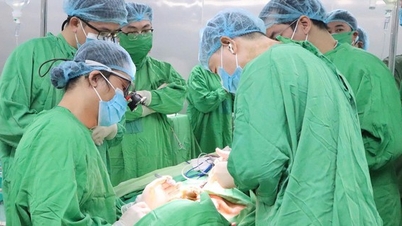











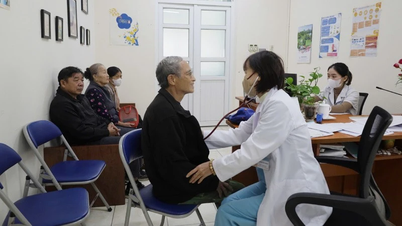




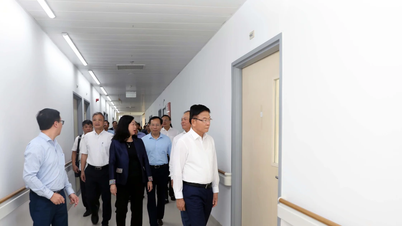































![[OFFICIAL] MISA GROUP ANNOUNCES ITS PIONEERING BRAND POSITIONING IN BUILDING AGENTIC AI FOR BUSINESSES, HOUSEHOLDS, AND THE GOVERNMENT](https://vphoto.vietnam.vn/thumb/402x226/vietnam/resource/IMAGE/2025/12/11/1765444754256_agentic-ai_postfb-scaled.png)






























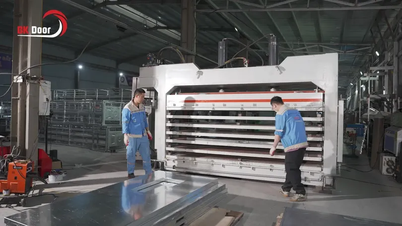





















Comment (0)